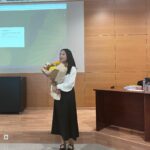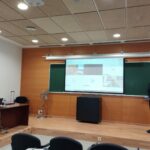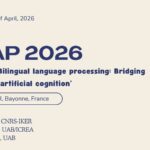3 juny, 2024
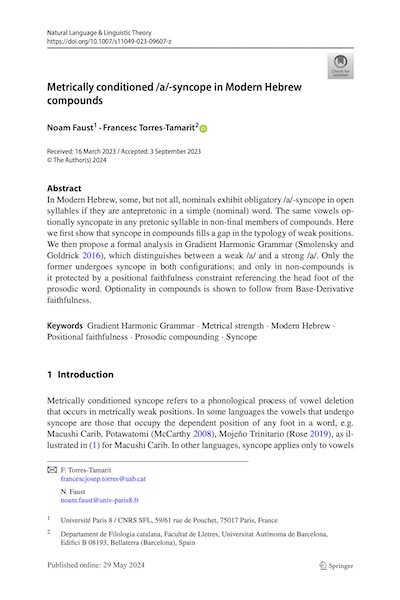
Autors:
Noam Faust & Francesc Torres-Tamarit
Títol:
Metrically conditioned /a/-syncope in Modern Hebrew compoundsEditorial: Natural Language & Linguistic Theory (Springer Link)
Data de publicació: 29 maig 2024
Text completIn Modern Hebrew, some, but not all, nominals exhibit obligatory /a/-syncope in open syllables if they are antepretonic in a simple (nominal) word. The same vowels optionally syncopate in any pretonic syllable in non-final members of compounds. Here we first show that syncope in compounds fills a gap in the typology of weak positions. We then propose a formal analysis in Gradient Harmonic Grammar (Smolensky and Goldrick 2016), which distinguishes between a weak /a/ and a strong /a/. Only the former undergoes syncope in both configurations; and only in non-compounds is it protected by a positional faithfulness constraint referencing the head foot of the prosodic word. Optionality in compounds is shown to follow from Base-Derivative faithfulness.
26 novembre, 2024

Autors:
Francesc Torres-Tamarit
Títol:
Proceedings of the 39th West Coast Conference on Formal LinguisticsEditorial: Cascadilla Proceedings Project, Somerville, MA, USA
Data de publicació: 2024
Més informació
Text completAccording to Loporcaro's (2015) book on Romance length, contrastive vowel length in northern Italo-Romance is metrically-governed and implicationally distributed. CVL in proparoxytones implies CVL in paroxytones, but not the other way around. Likewise, CVL in paroxytones implies CVL in oxytones, but not vice versa. This paper develops a foot-based OT analysis of CVL in northern Italo-Romance that combines layered feet (Martínez-Paricio & Kager 2015) with uneven trochees (Jacobs 2019). The analysis adequately predicts the implicational distribution of CVL and discards unattested patterns.
11 juliol, 2025
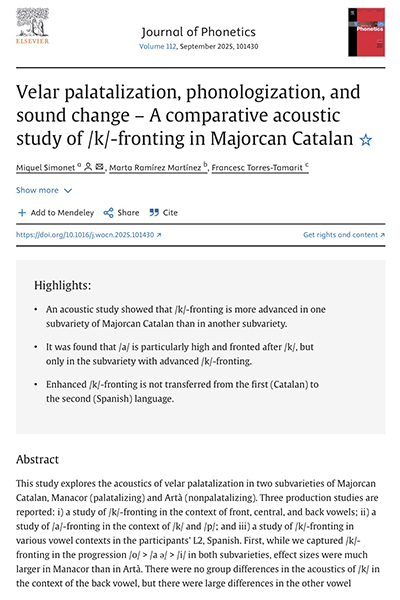
Autors:
Simonet, Ramírez Martínez & Torres-Tamarit
Títol:
Velar palatalization, phonologization, and sound change – A comparative acoustic study of /k/-fronting in Majorcan CatalanEditorial: Journal of Phonetics
Data de publicació: 2025
Més informacióThis study explores the acoustics of velar palatalization in two subvarieties of Majorcan Catalan, Manacor (palatalizing) and Artà (nonpalatalizing). Three production studies are reported: i) a study of /k/-fronting in the context of front, central, and back vowels; ii) a study of /a/-fronting in the context of /k/ and /p/; and iii) a study of /k/-fronting in various vowel contexts in the participants’ L2, Spanish. First, while we captured /k/-fronting in the progression /o/ > /a ə/ > /i/ in both subvarieties, effect sizes were much larger in Manacor than in Artà. There were no group differences in the acoustics of /k/ in the context of the back vowel, but there were large differences in the other vowel contexts, particularly before the central vowels. We postulate that, whereas the degree of palatalization found in Artà may result from universal coarticulatory principles, palatalization in Manacor results from speaker-controlled phonetic behavior: enhanced coarticulation. Second, we found that in Manacor (but not Artà) /a/ was more fronted when it followed /k/ that when it followed /p/. We suggest that the /a/-fronting pattern found in Manacor results from the influence of its velar-palatalization process and not vice versa. Finally, we found that the enhanced velar-palatalization process in the Manacor sample was not transferred to their L2. We discuss the implications of our conclusion for our understanding of the diachrony of velar palatalization in Romance.
26 gener, 2026
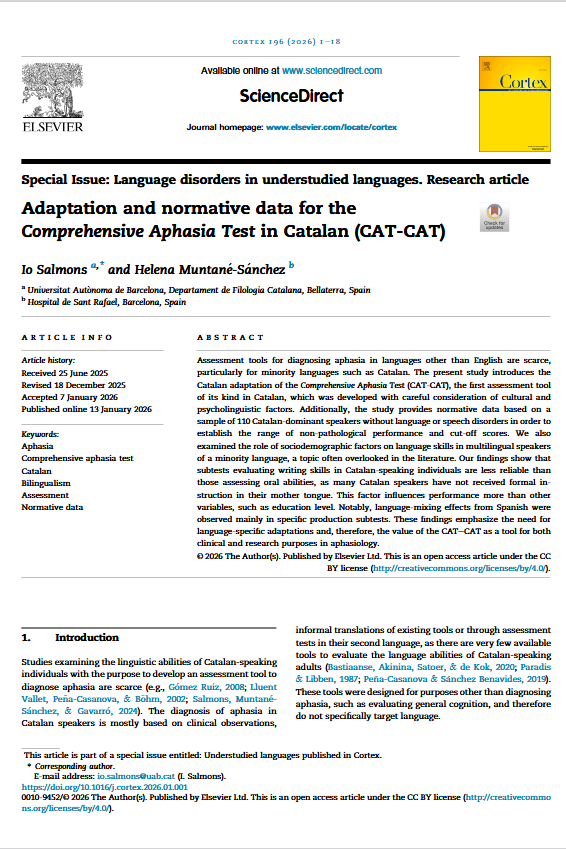
Autors:
Io Salmons & Helena Muntané-Sánchez
Títol:
Adaptation and normative data for the Comprehensive Aphasia Test in Catalan (CAT-CAT)Editorial: Cortex
Data de publicació: 2026
ISBN13: 0010-9452
Text complet
Assessment tools for diagnosing aphasia in languages other than English are scarce, particularly for minority languages such as Catalan. The present study introduces the Catalan adaptation of the Comprehensive Aphasia Test (CAT-CAT), the first assessment tool of its kind in Catalan, which was developed with careful consideration of cultural and psycholinguistic factors. Additionally, the study provides normative data based on a sample of 110 Catalan-dominant speakers without language or speech disorders in order to establish the range of non-pathological performance and cut-off scores. We also examined the role of sociodemographic factors on language skills in multilingual speakers of a minority language, a topic often overlooked in the literature. Our findings show that subtests evaluating writing skills in Catalan-speaking individuals are less reliable than those assessing oral abilities, as many Catalan speakers have not received formal instruction in their mother tongue. This factor influences performance more than other variables, such as education level. Notably, language-mixing effects from Spanish were observed mainly in specific production subtests. These findings emphasize the need for language-specific adaptations and, therefore, the value of the CAT–CAT as a tool for both clinical and research purposes in aphasiology.
6 febrer, 2024
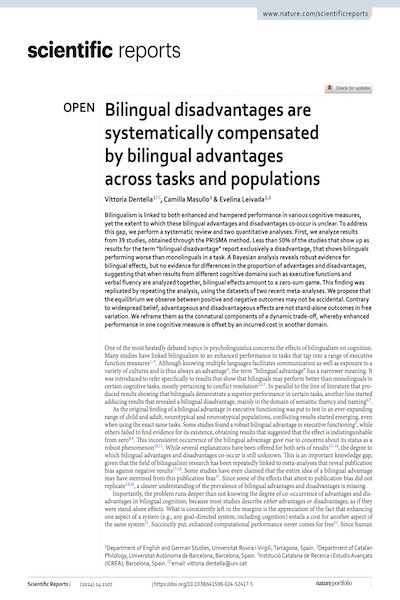
Autors:
Vittoria Dentella, Camilla Masullo & Evelina Leivada
Títol:
Bilingual disadvantages are systematically compensated by bilingual advantages across tasks and populationsEditorial: Scientific Reports (Springer Nature)
Data de publicació: 24 de gener del 2024
Text completBilingualism is linked to both enhanced and hampered performance in various cognitive measures, yet the extent to which these bilingual advantages and disadvantages co-occur is unclear. To address this gap, we perform a systematic review and two quantitative analyses. First, we analyze results from 39 studies, obtained through the PRISMA method. Less than 50% of the studies that show up as results for the term “bilingual disadvantage” report exclusively a disadvantage, that shows bilinguals performing worse than monolinguals in a task. A Bayesian analysis reveals robust evidence for bilingual effects, but no evidence for differences in the proportion of advantages and disadvantages, suggesting that when results from different cognitive domains such as executive functions and verbal fluency are analyzed together, bilingual effects amount to a zero-sum game. This finding was replicated by repeating the analysis, using the datasets of two recent meta-analyses. We propose that the equilibrium we observe between positive and negative outcomes may not be accidental. Contrary to widespread belief, advantageous and disadvantageous effects are not stand-alone outcomes in free variation. We reframe them as the connatural components of a dynamic trade-off, whereby enhanced performance in one cognitive measure is offset by an incurred cost in another domain.







